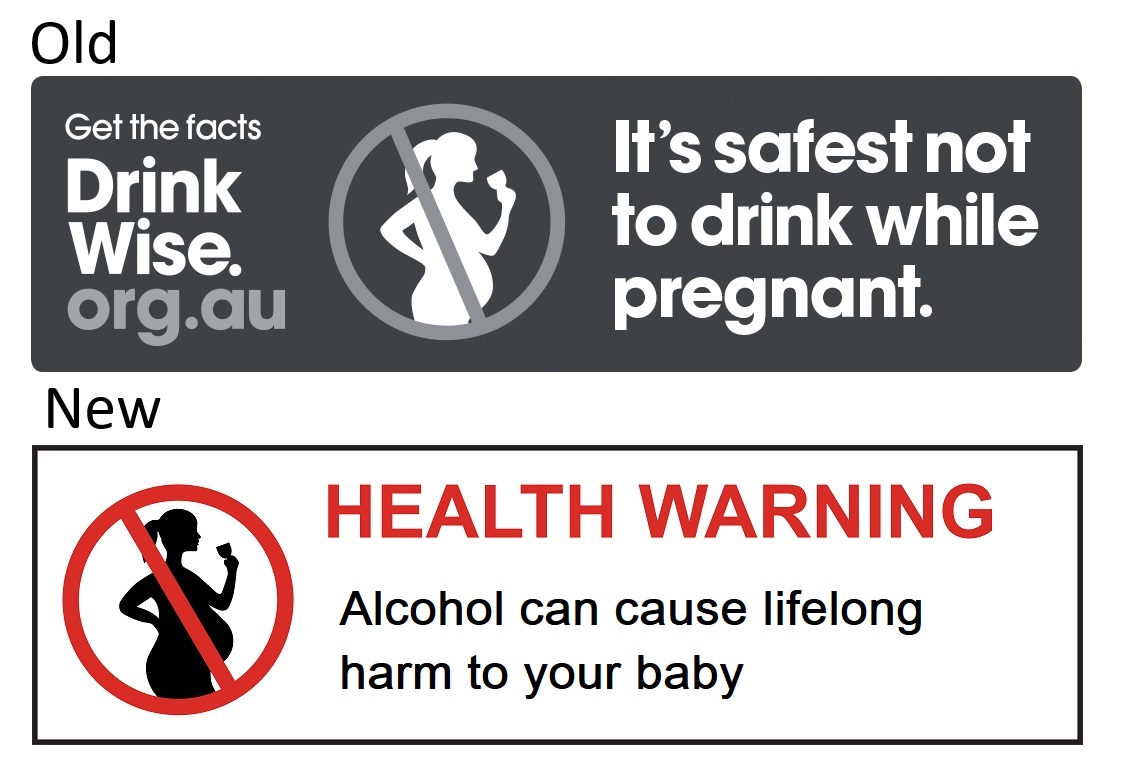A majority of Food Forum Ministers have voted in favour of a prescribed colour scheme on mandatory pregnancy labels on alcohol products, a move that will cost the industry millions, and will see some businesses close and people lose their jobs.
The Ministers for Health of Victoria, Tasmania, Western Australia, ACT, Northern Territory and New Zealand chose to ignore mandating legibility and contrast standards in the labels, and pressed ahead with the three colour scheme.
With many of the countries small and independent brewers, winemakers and distillers already staring financial hardship directly in the face after drought, bushfire and COVID-19, this is likely to be too much for some.
Andrew Wilsmore, CEO of Alcohol Beverages Australia, said the decision was not about mandatory labelling, as producers support that. Instead, he said, it was about cost and the resultant impact on business and jobs.
“We’re extremely disappointed that some Ministers have chosen to ignore the voices of thousands of small brewers, winemakers and distillers across the country by deviating from the usual requirements for contrast colours in favour of a strict red-black-white colour scheme that will cost producers hundreds of millions of dollars per year,” Wilsmore said.
“Even poison labels don’t have to meet those requirements.”
It’s a sentiment echoed by Tony Battaglene, Chief Executive of Australian Grape & Wine who said the association has consistently supported the introduction of mandatory pregnancy warning labels.
He added: “We are deeply disappointed at the decision of Food Forum Ministers to approve a flawed label that will cost industry and consumers $400m.
“In requiring the warning label to carry specific colours, Food Forum Ministers have imposed significant costs on winemakers for no measurable public health benefit. Every other warning label in the Food Standards Code, such as those for allergens, require contrasting colours only.
“Australia’s winemakers are hurting after a summer of drought, fire and smoke taint, followed by months of trading restrictions imposed due to the coronavirus pandemic. Many winemakers will not come back – and this decision will result in even more cellar doors closing permanently and wine industry jobs lost. These losses will be felt most acutely by small businesses across regional Australia.
“Despite the leadership shown by the Commonwealth – supported by New South Wales, Queensland and South Australia, who all voted for the equally effective, but much cheaper contrast option – other jurisdictions chose an option that they know will hurt small businesses already doing it tough. In particular, the Governments of Victoria, Western Australia and Tasmania must explain their decision to the large number of winemakers, their families and their employees in their states.
“Ultimately, this exercise has been driven by ideologically driven, powerful and well-funded anti-alcohol groups with no regard for the people and communities of rural and regional Australia that depend on a thriving Australian wine industry.”
The Independent Brewers Association (IBA) said the decision could bring the beer industry to its knees with the loss of more than 600 breweries and 3000 Australian jobs.
“This decision is one of the worst examples of over-regulation in recent memory,” said Peter Philip, Chairman of the IBA and founder of Wayward Brewing in Camperdown, Sydney.
“We support mandatory labelling, but we’re extremely disappointed that certain Ministers have chosen to ignore the pleas of indie brewers across the country.
“By deviating from the usual requirements for contrast colours in favour of a strict red-black-white colour scheme, 600 small brewers are under threat including the thousands who work for them.
“It will absolutely result in people losing their jobs and the cost of independent beer to go up.
“This will be devastating to small breweries at a time when we are just starting to recover from COVID-19 and are looking down the barrel of a global recession.”
The IBA has estimated the cost of implementation to exceed $113m over the next 10 years including $44m in one-off costs.
Philip added: “It is deeply disappointing that this sensible and balanced proposal did not enjoy the support of all States and Territories and indie beer loving consumers should rightly hold these politicians to account in the next election for the loss of their local indie brewery.”
Wilsmore explained that many small producers would be faced with set-up costs of close to $100,000 to pay for the initiative, which when combined with the ongoing devastating impacts of COVID-19 would push some them over the brink and out of business.
“Larger producers will also take a big hit, with one-off costs equivalent to the annual salaries of close to 6,500 employees,” he said.
“Mandatory pregnancy labelling is a positive step forward, but the same outcome of a highly visible warning could have been achieved at far less cost, and this couldn’t have come at a worse possible time for producers.
“On behalf of Australia’s award-winning beer, wine and spirit producers we commend the Commonwealth, NSW, Queensland and South Australia for moving an amendment to provide for an impactful yet affordable contrast label similar to all other food and beverage warnings. It is deeply disappointing that this sensible and balanced proposal did not enjoy the support of the other States and Territories.”

